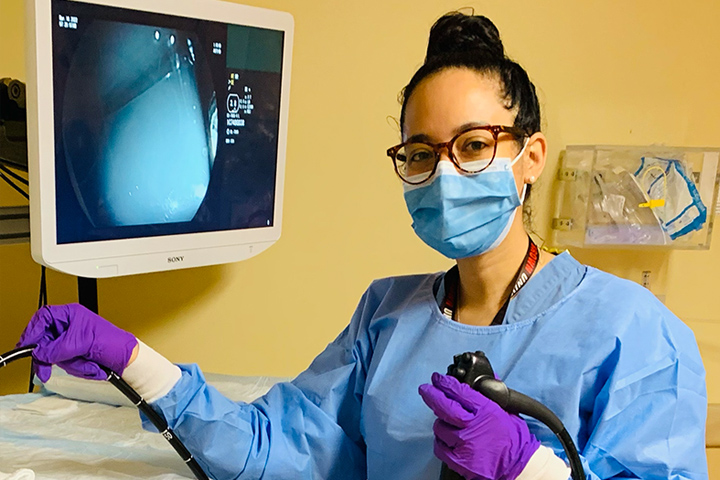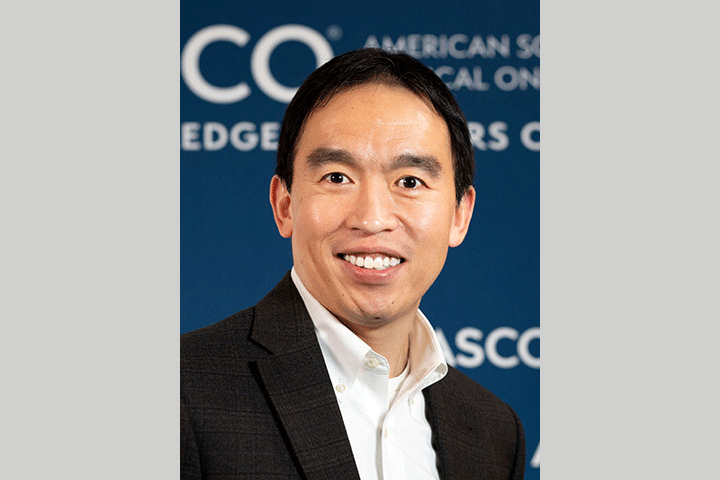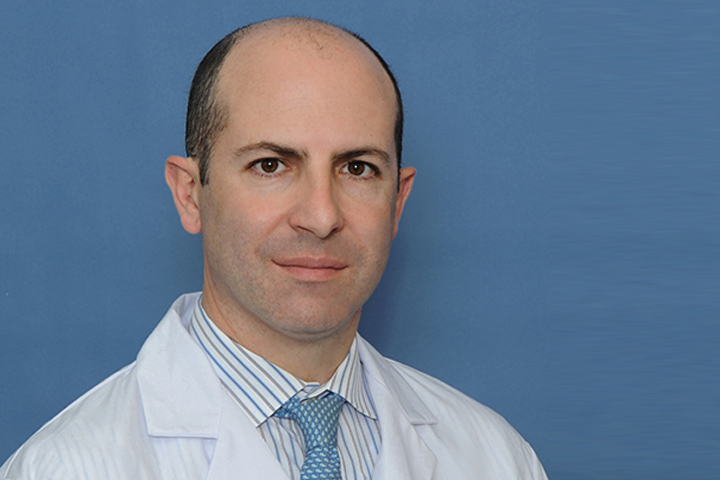Meet the Researcher: Nicolette Juliana Rodriguez, M.D., M.P.H.

Early career investigators pave the way for the future breakthroughs in pancreatic cancer treatment.
At the 2022 AACR Special Conference: Pancreatic Cancer, Let’s Win supported the attendance of four early career pancreatic cancer scientists. We will be featuring their important work over the next few months. This month we learn more about Dr. Nicolette Rodriguez.
A Long-Time Career Choice
When she was four years old, Nicolette Rodriguez wanted to be a superstar or a neonatologist. Or maybe a superstar neonatologist. Although Rodriguez is quick to point out that her dream of superstardom didn’t last past first grade, her love of medicine blossomed.
In the ensuing years, Rodriguez earned her M.D. and M.P.H. from the Warren Alpert Medical School of Brown University and Brown University School of Public Health (Providence, Rhode Island). She completed her internship and residency training in internal medicine at Yale New Haven Hospital (Connecticut) and is currently a gastroenterologist at Brigham and Women’s Hospital and Instructor of Medicine at Harvard Medical School (Boston). In addition, she is the co-director of Fellowship Initiatives for Trainees Underrepresented in Medicine in the Department of Medicine at Brigham and Women’s Hospital. She is also an early career investigator in the Division of Cancer Genetics and Prevention at Dana-Farber Cancer Institute under the mentorship of Sapna Syngal, M.D., M.P.H.
The specialty of gastroenterology appealed to Rodriguez because not only could she diagnose her patients, but she could also treat them with an array of procedures. “I really love the field, because in one sense you are using two different sides of your brain,” she says. “By talking to patients and assessing their symptoms you can come up with a diagnosis, and with a procedure like a colonoscopy you can screen a patient and potentially treat them at the same time.”
Rodriguez plans on combining her clinical expertise with her penchant for research. As a first-generation Latina, one of her goals is to help historically marginalized populations navigate their way through the complex landscape of U.S. healthcare. Her hope is to first find reasons why there is such a pervasive problem and then to find solutions to these healthcare inequities. “I’m the daughter of immigrants, and I saw firsthand when I was very young how language barriers and access could make things more difficult for people, especially when it came to healthcare,” explains Rodriguez, whose mother was a bacteriologist in her native Colombia and who learned English so she could continue working in the field when she came to the United States.
“My mom died of breast cancer when I was just 17, and she and my dad were big inspirations to me,” she says. “I just knew I was going to wind up in medicine, and once I learned more about gastroenterology and cancer research I knew it was for me. I wanted to concentrate my research on access to cancer genetics and prevention because I think it’s very important, so I began looking at disparities in colon cancer screenings and the disproportionate effect those disparities have on historically marginalized populations.
“I come from a historically marginalized population, and I know firsthand how difficult things can be in trying to understand the healthcare system, gain access to tests that can potentially save your life, and even understand what doctors are talking about. I’d like to see what can be done, what we can do, to make it better.”
Improving Pancreatic Cancer Genetic Testing in Minority Populations
Pancreatic cancer is a major health concern. Though considered somewhat rare, in the next few years it is expected to become the second leading cause of cancer deaths in the United States. Health disparities in the treatment of pancreatic cancer exist across a spectrum of factors, including race and ethnicity, socioeconomic status, distance to quality care, and insurance. For example, Black and Hispanic patients are generally diagnosed later in the disease course, have lower rates of surgical resection, are more likely to be treated at low-volume hospitals, and often experience higher rates of morbidity and mortality when compared to white patients.
Both Syngal, who serves as principal investigator, and Rodriguez, who serves as project lead, are undertaking a multi-phase study called REGENERATE. That acronym stands for the Racial/ethnic Equity in GENetic Education, Risk Assessment and TEsting Study. The project is funded by Pancreatic Cancer Action Network (PanCAN).
The goal is to improve access to genetic testing and awareness of early pancreatic cancer prevention strategies among Black and Latino/a/x families at risk for pancreatic cancer. “The reality is that Black and Latino/a/x populations have lower referral rates to genetic counseling and genetics care when compared to white populations,” Rodriguez says.
“There’s a lot of reasons behind this. Genetic testing isn’t easy for anyone, so you have to establish a strong doctor–patient relationship. You also need to meet people where they are with materials they can understand, and you have to make it easier for them. So what we want to do is to have these populations tell us what they need and then we need to implement those findings into workable solutions. Genetic testing is too important to ignore and so if you have these populations working with you at the beginning of your research all the way to the end, the chance of success is greatly improved.”
Let’s Win has covered the REGENERATE study in depth. “I’m really excited about this research,” Rodriguez adds. “Pancreatic cancer is a terrible disease, but we are making some progress. We need to do more, and intercepting this disease in its earliest stages could have such a positive effect on people. My mentor [Syngal] is absolutely committed to this, as am I.”
Although Rodriguez has a lot on her plate and has been the recipient of many honors, don’t call her a superstar. “I really am doing what I love,” she emphasizes. “I think I’m really fortunate to be able to do that.” In her spare time, which she admits isn’t a lot, Rodriguez enjoys traveling. “I think my favorite place is Machu Picchu,” she says. “It’s breathtaking to see indigenous culture and the architecture while being surrounded by nature.”
And she admits she’s a bit of a “foodie” when she travels. “I’m not fancy, though,” she laughs. “I like walking around and finding little hole-in-the-wall restaurants wherever I go. That’s where you can find the best food, plus you get to meet people and learn more about the culture. That’s what makes traveling so much fun.”






